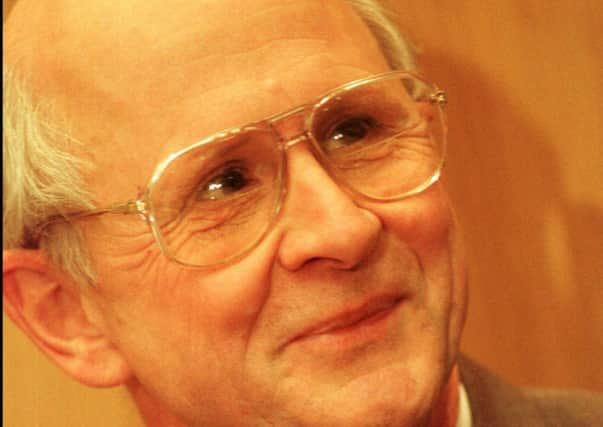Celtic: McCann reignites debate over England move


When the Scots-Canadian businessman overthrew the dynastic regime to take control at Celtic Park on 4 March, 1994, he ruthlessly and successfully set about fulfilling commercial potential which had been wastefully untapped for so long.
Two decades on, Celtic are currently the undisputed superpower of a very different domestic environment, with only the unguaranteed riches of Champions League participation able to sustain their monetary size and status.
Advertisement
Hide AdAdvertisement
Hide AdAs he reflected on the 20th anniversary of his seismic intervention at the club, McCann was typically forthright in his assessment of what the future holds for Celtic. He believes the long-running debate over relocation to English football needs to be re-ignited if the Scottish champions are to enjoy further growth in the years ahead.
“The English Premier League now dwarfs Scottish football financially and makes Celtic’s progress a daunting challenge,” said McCann. “Nowadays, supporters want the best, and that is impossible in Scotland generally with too many small clubs. This is obvious. It is a real achievement for Celtic to play in the Champions League group stage. In the last two years, they represented the smallest country. I would like to see the EPL expand and include Celtic. I think it could and should happen. It would triple the size of the club in financial terms, overnight.”
Since McCann sold up at Celtic in 1999, his prudent and hard-nosed approach to running the club has been maintained under current major shareholder Dermot Desmond and chief executive Peter Lawwell.
“Everybody wants to win all the time but not everybody can,” said McCann. “Football clubs should be ambitious but have to manage risk. Many have not done this well. And there is great temptation to do expensive, short-term deals. I worry about the effect of current owners who ‘do not care what it costs’, such as at Chelsea and Manchester City, on the overall game.”
McCann, of course, was infamously jeered by a section of the Celtic support, when unfurling the 1998 championship flag, for his perceived parsimony in the transfer market. “Frankly I think this was over publicised,” he added. “It was disappointing, but did not bother me greatly. People pay their money and have the right to applaud or boo as they wish. Every supporter has an opinion – which makes the whole game what it is. The facts were that we had reclaimed the league title, we had completed the best possible stadium, we had 53,000 season-ticket holders and made a record profit.”
Before launching his takeover bid, McCann had seen the Celtic board reject a £6 million offer from him to build two new stands at Celtic Park. But he was gratified by the chain of events it set off, taking Bank of Scotland to within a few hours of forcing the club into receivership before McCann stepped in.
“Looking back, I am glad they did not agree (to my offer for the stands),” he said. “Being an investor with no shares or authority, given what I was to learn about the mentality of that board, would have made for an unworkable relationship. And the task was soon shown to be a lot greater than just a construction and marketing job. It had become clear to the bank that they had no chance of being paid by Celtic unless the club obtained new capital. With the co-operation of (then Celtic vice-chairman) David Smith, they had pressured the board by demanding personal guarantees.
“Smith, friendly with the bank, and wanting to get “cash for the families” (which I would not promise) tried to set up a deal that would have them accept an offer from Gerald Weisfeld (a large customer of the bank) that would do this and take the bank off the hook, but provide no new investment in Celtic. This backfired when a majority of the board dismissed the company officers and rejected the deal.”
Advertisement
Hide AdAdvertisement
Hide AdAnother defining aspect of McCann’s tenure at Celtic was his battles with the SFA which saw the dismissal of Jim Farry as chief executive in the dispute over the delayed registration of Portuguese striker Jorge Cadete. He was also an arch-critic of the redevelopment of Hampden as Scotland’s National Stadium, a position he still forcibly maintains. “I am not aware of how the SFA operates currently – it has been a long time,” said McCann. “I would hope that the culture has changed from what I experienced. Namely, acting in ways that would weaken the Old Firm on the mistaken belief that their smaller member clubs would benefit. Such as the waste in funding Hampden Park, Glasgow’s unnecessary ‘No 3 Stadium’, while blocking Football Trust funding for Celtic Park, or £300,000 in fines and costs on Celtic for engaging a manager (Tommy Burns) who had made clear his wish to apply and had been making only £40,000 per year in the last year of his contract.”
Asked if there was anything he would do differently at Celtic if he had his time again, McCann is typically unwilling to indulge in such thoughts. “It’s always easy to be clever with hindsight,” he replied. “I made mistakes for sure, some of them people mistakes. But there’s no point in dwelling on them now. Aside from getting all the essential new capital in place, the best thing overall was getting the best people. I mean the quality and value of the board I had – and the club now has, the executive management and operating people.
“Of course, getting the best players we could afford was critical and that has been maintained, but the club also has 500 dedicated employees as well. Last but not least, raising an army of 50,000-plus season ticket holders, and now having 28,000 shareholders, these are the key people that make Celtic what it is.”
SEE ALSO